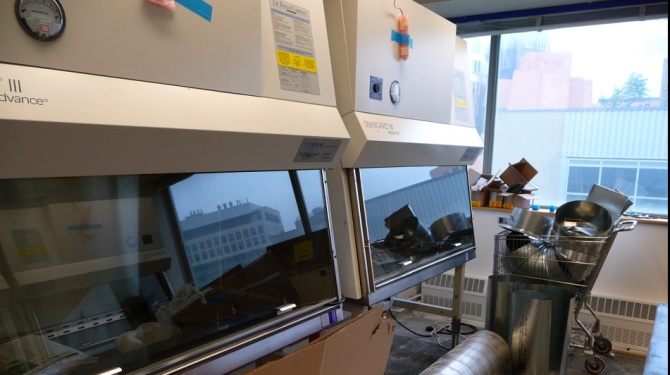Difference between revisions of "20.109(F08): Mod 2 Day 6 Journal Club I"
(→Probing Protein Protein Interactions) |
|||
| Line 11: | Line 11: | ||
#Chemical x-linking | #Chemical x-linking | ||
#*e.g. Wirschell M, et al. "Building a radial spoke: flagellar radial spoke protein 3 (RSP3) is a dimer" '''Cell Motil Cytoskeleton''' (2008) 65:238-48 [[PMID: 18157907]] | #*e.g. Wirschell M, et al. "Building a radial spoke: flagellar radial spoke protein 3 (RSP3) is a dimer" '''Cell Motil Cytoskeleton''' (2008) 65:238-48 [[PMID: 18157907]] | ||
| − | + | #Two hybrid-yeast | |
| + | #*e.g. Dutta S, et. al. "High-throughput Analysis of the Protein Sequence-Stability Landscape using a Quantitative Yeast Surface Two-hybrid System and Fragment Reconstitution" '''J Mol Biol.''' 2008 Jul 22.[[PMID: 18674545]] | ||
| + | #*e.g. Fields S, and Song O."A novel genetic system to detect protein-protein interactions" '''Nature''' 1989 Jul 20;340(6230):245-6.[[PMID: 2547163]] | ||
*Two hybrid-bact based on RNAP-alpha subunit, and based on cAMP signalling cascade | *Two hybrid-bact based on RNAP-alpha subunit, and based on cAMP signalling cascade | ||
*Phage display | *Phage display | ||
Revision as of 01:06, 9 August 2008
The list of papers below is provided as a guideline for the types of papers that might be relevant for your presentation. You will notice that the papers fall roughly into four categories- parts, devices, systems and artificial life.
You are not limited to the following list of primary research articles. The list is provided simply to give you an idea of the kinds of subjects that could make suitable presentations for the class. Search pubmed yourself to find articles of interest to you. Once you have decided on a paper for your presentation, please email it to nkuldell or astachow AT mit DOT edu, and also "reserve" it by putting your (initials/lab section/team color) next to the listing here. As you prepare your talk be sure to follow the specific guidelines for oral presentations in this class.
Probing Protein Protein Interactions
- GST fusion proteins
- e.g. Gueller S et al. "Adaptor protein Lnk associates with Y568 in c-Kit" Biochem J. (2008) doi:10.1042/BJ20080102
- co-IP
- e.g. Ozbay T, Nahta R. "A novel unidirectional cross-talk from the insulin-like growth factor-I receptor to leptin receptor in human breast cancer cells" Mol Cancer Res(2008) 6:1052-8. PMID: 18515755
- Chemical x-linking
- e.g. Wirschell M, et al. "Building a radial spoke: flagellar radial spoke protein 3 (RSP3) is a dimer" Cell Motil Cytoskeleton (2008) 65:238-48 PMID: 18157907
- Two hybrid-yeast
- e.g. Dutta S, et. al. "High-throughput Analysis of the Protein Sequence-Stability Landscape using a Quantitative Yeast Surface Two-hybrid System and Fragment Reconstitution" J Mol Biol. 2008 Jul 22.PMID: 18674545
- e.g. Fields S, and Song O."A novel genetic system to detect protein-protein interactions" Nature 1989 Jul 20;340(6230):245-6.PMID: 2547163
- Two hybrid-bact based on RNAP-alpha subunit, and based on cAMP signalling cascade
- Phage display
- Genetic
- FRET
- GFP-PRIM
- mass spec
- AFM (= ligand/prot int'n?)
- Biacore
- Protease ftpt
- TAP
- inverse transition cycling
- in vitro exp'n
- Xenopus extracts to modify prots
- lambda fusion
- membrane two hybrid (yeast)
- b-gal complementation
- ScFV
- library of prot frags
- Peptide aptamers
- catalytic antibodies
- ribosome display (= ligand/prot int'n?)
- computational approaches
Chromatin remodeling
- Ma J et al. "Unconventional Genomic Architecture in the Budding Yeast Saccharomyces cerevisiae Masks the Nested Antisense Gene NAG1" Eukaryotic Cell(2008) 7(8): 1289-1298 doi:10.1128/EC.00053-08
